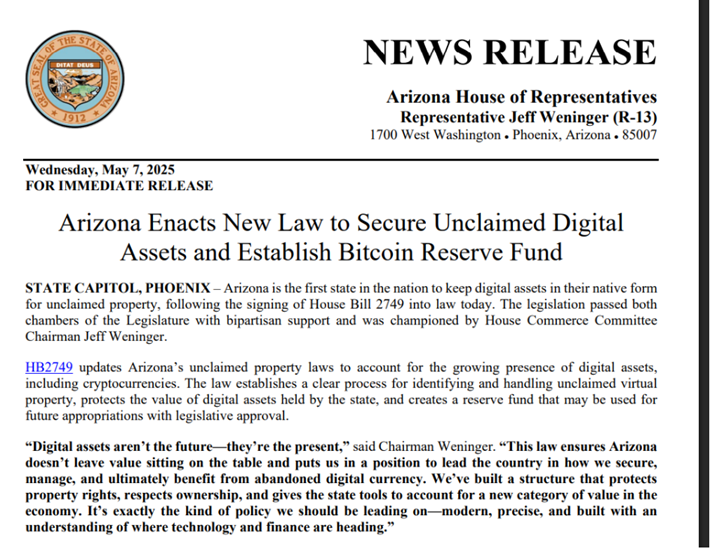Arizona just tossed a grenade into the world of crypto policy and the explosion is all good news for Bitcoin fans. On Wednesday, Governor Katie Hobbs signed House Bill 2749 into law, making Arizona the first state to hold unclaimed digital assets like Bitcoin without dumping them for cash. Instead, the state will stash these forgotten cryptos in a shiny new Bitcoin reserve fund, turning dormant coins into a potential goldmine for public coffers.
If your Bitcoin, Ethereum, or even that random meme coin you forgot about sits untouched for three years, Arizona’s coming for it but not to sell. The state will now keep crypto in its original form, a sharp U-turn from old-school rules that forced states to liquidate unclaimed property. “This isn’t just about guarding crypto it’s admitting this stuff isn’t going anywhere,” laughed a Phoenix-based crypto lobbyist. “Arizona’s betting digital assets are as permanent as cactus in the desert.”
The real kicker? That Bitcoin reserve fund. Think of it as Arizona’s crypto piggy bank, where a slice of these abandoned assets will ride the market’s rollercoaster. If prices soar, the state could score big, a gamble that’s already got traders buzzing. “Forget ‘not your keys, not your crypto’ now it’s ‘not your transactions, not your crypto!’” joked one Reddit user.
But while Arizona cracks open the champagne, other states are face-planting. Florida’s plan to funnel 10% of public funds into Bitcoin? Dead on arrival. Last week, bills HB 487 and SB 550 vanished faster than a Satoshi in a bear market, never making it to a vote. Oklahoma, Wyoming, and five others also tripped over similar proposals, proving that even in crypto-crazy America, red tape rules.
Why’s Arizona succeeding where others flop? Timing and tweaks. The state piggybacked on New Hampshire’s recent win (Bill 302, which let its treasury dabble in crypto) but added a twist by tackling the messy reality of lost wallets. “Most states don’t know a hardware wallet from a leather one,” shrugged a lobbyist.
For everyday hodlers, the message is clear: Log into those old exchanges, update your contact info, and maybe send a transaction or two. Otherwise, your cold storage could end up filling Arizona’s Bitcoin reserve fund—a plot twist even Satoshi didn’t see coming.
So, what’s next? Critics warn of legal tangles (what if Bitcoin crashes?) and privacy hawks side-eye the state’s custody claims. But Arizona’s doubling down, betting its Bitcoin reserve fund could become a model for blending crypto and governance. As one lawmaker smirked,
“We’re not just holding bags—we’re building a vault.”
The rest of the country? Still stuck in committee hearings. But with states hungry for crypto cash and voters demanding innovation, Arizona’s experiment might just light the way or crash spectacularly. Either way, grab the popcorn. This policy drama’s hotter than a Phoenix summer.
















